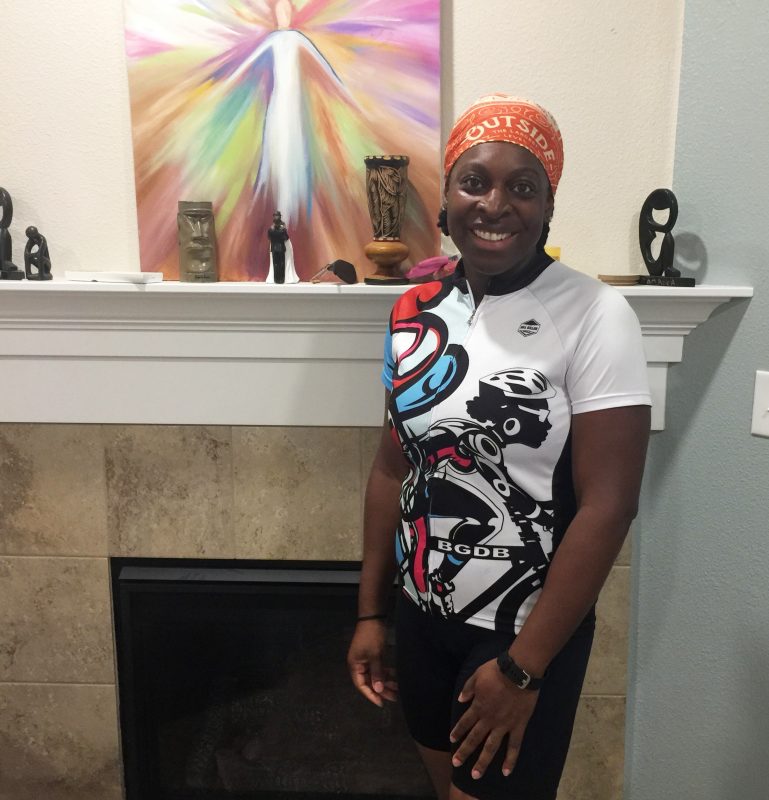
(Photo courtesy Keyonda McQuarters)
This is the fourth installment of our Women’s Bike Month interview series written by Steph Routh. This content is sponsored by the Community Cycling Center and Gladys Bikes.
Black Girls Do Bike is a national organization with over 75 local chapters. The organization was created to champion efforts introducing the joy of cycling to all women, but especially black women and girls.
Keyonda McQuarters stepped up as the Portland Chapter’s admin for about a year now and has been leading two rides on average per week ever since. She is so excited about BGDB that she was willing to spend time with me on her birthday at Bipartisan Cafe talking about it.
Why did you decide to lead the Portland chapter of Black Girls Do Bike?
I’ve been leading Black Girls Do Bike for a year now, and I think one the of the challenges is overcoming barriers, real or perceived, that inhibit Black women from being present and involved in the bike community. Every time I’m on my bike, I’m always looking for me. I’m looking for women who look like me. While I do see them, they are few and far between. One of my goals is knocking down those barriers, of creating a community that welcomes Black women.
There’s this stigma in the Black community that cycling is just a mode of transportation when you’re poor. I use my bike a lot, and so it’s about working against those stereotypes.
I want to create a space that is welcoming where I can say, “I will ride with you.” They might not know how to start, or they might feel more comfortable riding in a group with people who look like them.
How did your relationship to cycling begin?
I have been riding since I was four years old. So to be reintroduced to that as an adult, to be reacquainted to it as an adult, and to acquaint your children with biking. That’s been it.
I grew up in Chicago. If you read the cycling magazines right now, it’s one of the top biking cities. But 10-12 years ago, that was not the case. So when I tried to find avenues to take my children biking in Chicago, it was a whole event. You had to find a route. You would drive to the lake. And you wouldn’t see families like ours that bike.
One thing that you learn about Portland when researching it is, it’s such a bike-friendly city. But when I got here, I didn’t see people like me biking. You see people in spandex groups on the Steel Bridge. I had to tell myself that you don’t have to look like that to ride.
How do people find the group?
Social media is our biggest point of contact. It’s so funny. When I took it over last year, it had been in existence but had been dormant. So I just said, “I’m leading a ride.”
I would do these videos and would post them to the page. I would post about me riding, about my family riding. I’d just post as much as I could. Then my friends, they said, “You look like you’re having fun. I want to ride too!” One friend just started a PhD program, and she got a bike and a bag and she’s commuting to class. I am happy to be the gateway to that. I’m proud of that.
A lot of people say “I rode my bike a lot when I was a kid.” And I would ask them how they felt when they rode, and they say, “Oh, it was so much fun.” And I try to encourage them to feel that again.
Some people say that they can’t afford a bike. I say that it’s about the bike you have access to. Don’t not come because you don’t have the right bike. I still feel that way sometimes. I have a hybrid, and that’s what I ride, and it’s the right bike for me in this moment.
How did it feel to lead your first ride? Were you nervous?
Of course. I had started riding with this group called Biking Betties. It was led by this wonderful ride leader. The more I biked with Biking Betties, the more I learned about Portland. The city looks different on a bike. She made me feel so confident that I wanted to help other people feel that way.
So I went to Black Girls Do Bike and led a ride. I thought: What if I get lost? What if I get turned around? But I decided, Forget it, I’m just going to lead this ride. And people showed up, like three or four people to our first ride. And they trusted me. I had never done a group ride before Biking Betties. I made a commitment after that to do two rides a week—one during the week, and one on the weekend.
Do other people sometimes lead?
Sometimes. There are some regulars who come. I went on vacation back to Chicago this summer. So when I was gone, three people led rides. They took pictures. One led a ride to Peninsula Park. Another person did the Springwater. Another did a neighborhood ride. We have a lot more women riding, a lot more Black women riding. I tell people that you don’t have to lead a ride like me. Do what you’re comfortable doing.
What are some of the anxieties about cycling you hear from first-time riders?
I hear a lot, “Well, I’m slow.” So I make sure to emphasize that this is a no-drop ride; the newest person sets the pace. People are concerned that they will hold the group back, but we are part of a community.
A lot of people don’t know how to ride with traffic. So I tell them we’ll do a mix of trails and signals. We go over traffic signals and rules. This makes people feel more comfortable. I also try to have a seasoned rider in the back. There’s a video from last year on our Facebook page of someone who said, “I had never ridden in traffic before, and you make me feel so great.” I love that. I love to ride in the city and don’t want to just ride bike trails.
Advertisement
How about racial profiling? How does that factor into group conversations?
We do talk about that in Black Girls Do Bike. But I want people to feel safe. It’s walking a very fine line. There are times when a couple of women and I are biking, and that truck drives just a little too close. And I know we all ask, is it because I’m a cyclist, or because I’m a woman, or because I’m a Black woman?”
Sometimes there is a White person at a crosswalk, and I’m riding behind a car, and I see cars stop. But then I can be at a crosswalk, and I will be waiting a long time. Those are not the battles you fight, because they are not the battles you can win, and you just end up being exhausted.
What is a dream you have for the city?
[laughs] I’m laughing because that’s so multi-faceted. I’ll just say this: before we moved to Portland, some of the things you hear is that Portland is so liberal and welcoming and accepting. So as a Black woman, you come expecting one thing. But when you get here, you see something totally different. I think Portland is comfortable with the reputation of being liberal, welcoming, and accepting without being liberal, welcoming, and accepting.
I would love to see a Portland that lives up to that reputation. That there is a frame of equity working for everyone. A person who doesn’t have a house, the issues facing our schools, gentrification, all of that. I would like to see a Portland that really wants to solve and address those things that keep this great city from being great. I really love living here, but there are some things that keep it from being great. And it doesn’t have to be that way.
Who would you Red Rover to make that dream happen?
I would simply Red Rover the people of Portland, the people who call this city home and say, “Together, let’s make this great city good. Let’s all get uncomfortable. Let’s all be willing to get our hands dirty and to sacrifice, to share in the burdens of a neighbor, of a stranger even.” What if we were all willing to see this child as my child, as this older person as my parent? I would call on the people of Portland. This is our place.
How can White people support Black Girls Do Bike?
I can say that in our community, we have some wonderful allies who are part of our group and have supported me in moving from the desire to lead a ride, to a person who could actually lead a ride. I love having them there. I think one of the ways in which White men and White women can support us is to create an intentional space where Black women can feel welcome, where Black women are able to take the lead, where Black women feel like the space was intentionally created for us.
I went on a ride with another group, and I was the only Black woman. It was assumed that I couldn’t ride. There were so many assumptions that came with this group. Had I not been a seasoned rider and felt competent, I probably wouldn’t have gone on the ride. But I did. It was a long ride, and when we took a coffee break, a White man came up and said, “Oh you really can ride.” My response was, “Yes, I ride a little.” But before, I was completely invisible because I was engulfed by these perceptions. We come to these spaces and we are invisible.
Just see me as a bike rider that came here to come on this ride. We just want to ride. Assume she just wants to ride. I just want to ride my bike and be with people who want to ride with me.
Who are your sheroes?
My mother, I would have to say. She just taught me so many things. How to overcome obstacles, to move beyond stereotypes, how to follow my heart. To watch her create that for me, with what could be perceived as limited resources, was nothing short of amazing. And after that, Michelle Obama!
— Steph Routh is the communications director for the Community Cycling Center.
Never miss a story. Sign-up for the daily BP Headlines email.
BikePortland needs your support.



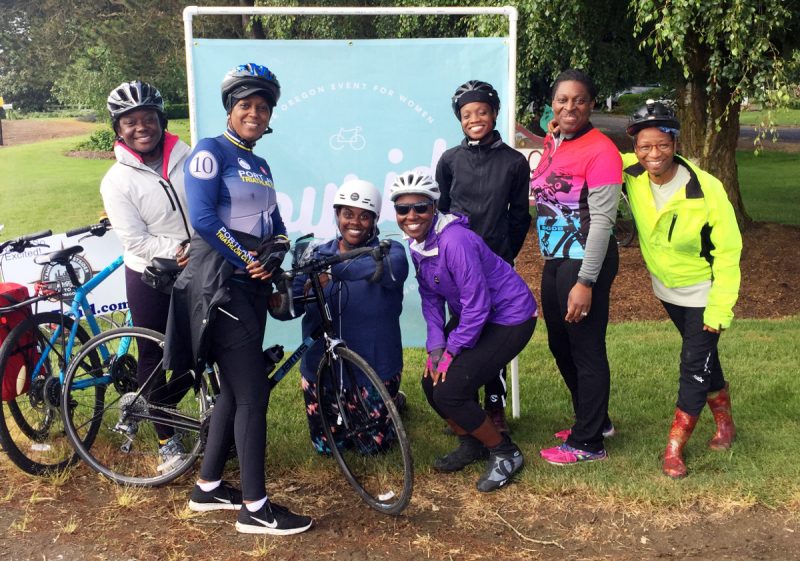
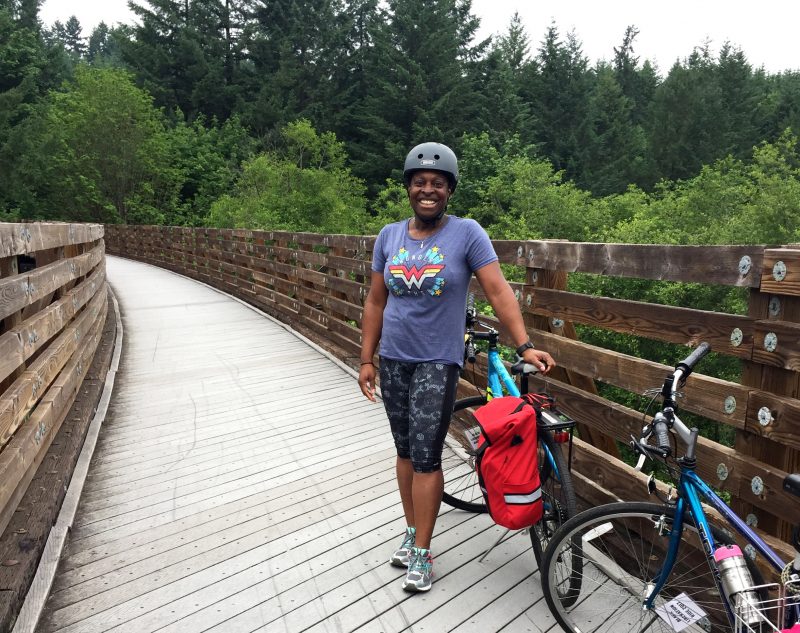
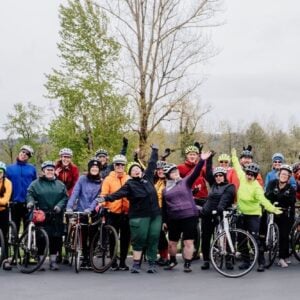
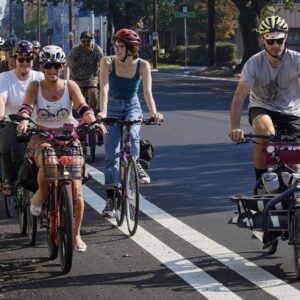

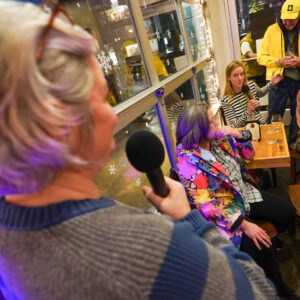
Thanks for reading.
BikePortland has served this community with independent community journalism since 2005. We rely on subscriptions from readers like you to survive. Your financial support is vital in keeping this valuable resource alive and well.
Please subscribe today to strengthen and expand our work.
Great article. So many smiles for so many miles!
It was awesome to read about Keyonda busting through stereotypes (of all kinds).
I’m enjoying this series so much! I love Keyonda’s vision for Portland.
“Those are not the battles you fight, because they are not the battles you can win, and you just end up being exhausted.”
Absolutely love your attitude! And that jersey is way cool, too.
“How can White people support Black Girls Do Bike?”
When I read this, I thought of the time I joined a Major Taylor bike ride in Oakland with a black riding buddy. As a middle-aged white guy, the shoe was definitely on the other foot, and it did feel uncomfortable being the minority. I stood out and got glances, though never felt unwelcome, it’s just not what I’m used to – and that’s a good thing. I think just empathizing with someone else’s situation is a baby step.
Great interview. Keyonda is the best! She is so encouraging of women to just get out there and give biking a try. I’ve never met a more positive, encouraging, welcoming cycling advocate. She helps newbies get started and urges more experienced riders to push themselves farther. She has built a supportive and welcoming community. Thank you Keyonda for all you do!
So many familiar concerns of new riders here plus more… magnified. Love the Banks-Vernonia trestle. Anyone know who designed the BGDB jersey? I might know of another jersey design project. Scott[at]ForumLawGroup.com
Awesome story! Thanks for the inspiration!
Great story and awesome jerseys!
To grow, biking needs to expand it’s demographics. Way to go.
Thank you Keyonda, you make Portland better by being here and doing what you do. I can identify with many aspects of your experience. I am very much almost always the only Asian guy on many group rides that I do in Portland. Just did an awesome gravel loop on the Toll/Trask roads up in logging country just this Saturday. Guess who was the only Asian guy there? Not saying the ride would’ve been any better if I wasn’t, just trying to make a point. Maybe I should see if John Liu wants to go on a ride. Are you Asian, John? 🙂
Love this! Thanks to Steph and Keyonda!
Great interview with Keyonda! It is so cool to learn about parts of bicycle culture in Portland that I am unaware of.
And this quote: “I think Portland is comfortable with the reputation of being liberal, welcoming, and accepting without being liberal, welcoming, and accepting.” Hits home, I try my best to be liberal, welcoming, and accepting but know that I can always do better. It is all about increasing one’s sense of community. Thanks Keyonda for telling it like it is.